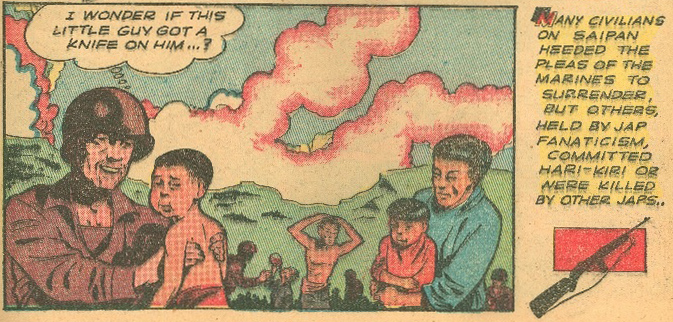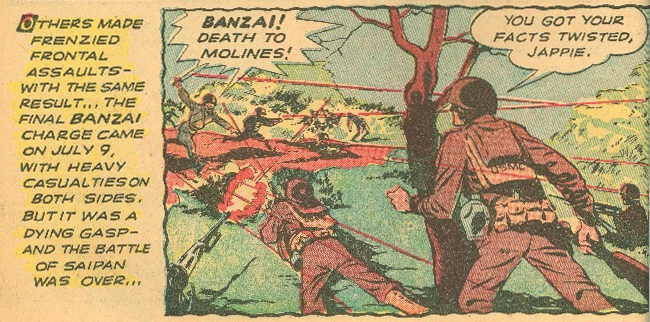When demonstrated by enemy forces, behaviors like aggression, selflessness, and daring were never seen as positive actions; they were always twisted so as to depict the enemy as unintelligent, brainwashed, or dishonorable.
The comic, “Saipan!” featured in The United States Marines, No. 4, tells the story of the Marine siege of Saipan, where, “…United States Marines cornered to death on Saipan…between 20,000 and 30,000 of its twentieth century robbers - the bandits from the land of the rising sun…”[^] The story intermixes similar racist and dehumanizing rhetoric towards the Japanese people with Marine attempts to communicate with the Japanese people and battle anti-American propaganda. One narrative adds, “Many civilians on Saipan heeded the pleas of the Marines to surrender, but others, held by Jap fanaticism, committed hari-kiri sic or were killed by other Japs.”[^] On the following page, a panel shows a Japanese soldier rushing into a storm of enemy fire, screaming, ”BANZAI! Death to Molines!” with a Marine responding, “You got your facts twisted, Jappie.”[^]
These acts of resistance, including civilians defending their homeland from foreign invaders and an enemy soldier disregarding his own well-being for the sake of his cause, would have been celebrated to no end if performed by an American. The latter situation, especially, is essentially the same story as those used to support American military aggression.[^] The Japanese practice of hari-kari was just as courageous and honorable in their culture as anything American soldiers did, but the practice was reframed as cowardly, and held as proof of this alleged fanaticism. Rather than recognizing and appreciating the heroism of these Japanese men, they are dismissed as being brainwashed by “Jap fanaticism.” These Japanese men have no agency according to this narrative; are simply being manipulated into losing their lives. This narrative thus depicts a superior American masculinity and diminishes the actions of the enemy troops.
Related Sections
- Adventurousness & Aggressiveness
- Adventurousness & Aggressiveness - A'feudin' and A'fightin'
- Adventurousness & Aggressiveness - Defend Your Country
- Adventurousness & Aggressiveness - Flight Into Fury
- Adventurousness & Aggressiveness - Li’l Abner Joins the Navy!
- Adventurousness & Aggressiveness - Palau
- Adventurousness & Aggressiveness - Pvt. Droop Has Missed the War!
- Adventurousness & Aggressiveness - Tarawa
- Adventurousness & Aggressiveness - The Fighting Redhead
- Adventurousness & Aggressiveness - Vanguard of Doom
Primary Sources
Secondary Sources




